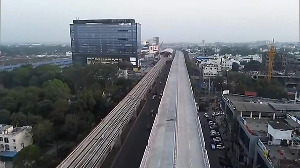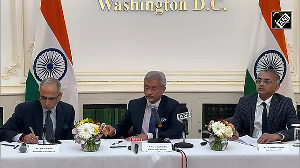Amidst worries of turbulent weather conditions, the National Aeronautics and Space Administration space shuttle Discovery was on its journey back home with its crew of 7, having successfully undocked from the international space station.
Concluding 9 days of cooperative work between the Discovery crew and that of the space station, the shuttle undocked from ISS at 2:24 AM local time on Saturday and is scheduled to land at the Kennedy Space Center in Florida on Monday, the US space agency said on its website.
Also read: NASA clears Discovery for landing
"The undocking and fly-around both went by the book," said Paul Hill, lead shuttle flight director for the orbiter's STS-114 mission.
"We couldn't be happier with the operational success of STS-114," he said.
Flight controllers are watching the weather for Discovery's return to Earth on Monday an are planning alternate landing sites, should rain storms in Florida prevent the early-morning touchdown.
Discovery's only landing target is NASA's Kennedy Space Center (KSC) in Cape Canaveral, Florida, where it launched spaceward on July 26. While the orbiter is slated to land at 01:16 hours IST on Monday, it could also land 02:51 IST if weather prevents the initial attempt.
Current weather predictions at KSC call for light and variable winds, a few scattered clouds and a slight chance of rain during the predawn hours of Discovery's landing opportunities, they added.
"That's about as good a forecast as you're going to get in Florida, but I have high hopes," said Wayne Hale, NASA's deputy shuttle programme manager, during a press briefing at the Johnson Space Center in Houston. "You don't commit until it's time to de-orbit."
By a chance of orbital mechanics, most of Discovery's landing approach will be over water though it will pass over parts of Central America and Cuba before reaching south Florida and homing in on the Shuttle Landing Facility runaway at KSC.
The ground track poses little risk to the populations the shuttle flies over, a new consideration for NASA since the Columbia orbiter broke apart over Texas in 2003, scattering debris across the region, shuttle officials said.
"These ground tracks are low risks in terms of public overflight hazards," Hale said."This is a new topic for us, (and) it's not a concern for our primary landing site at the Kennedy Space Center."
Also read: Discovery blasts off
As Discovery moved away to a distance of about 400 feet, Pilot Jim Kelly began a slow fly-around of the station.
Cameras on each spacecraft captured video and still images of the other. After the fly-around, Kelly executed the first of two separation burns to move Discovery away from the station and begin its trip home.
The entire crew commander Eileen Collins, Kelly, and mission specialists Andy Thomas, Wendy Lawrence, Steve Robinson, Charlie Camarda and Soichi Noguchi of the Japan Aerospace Exploration Agency (JAXA) enjoyed some scheduled off-duty time before going to sleep at 11:39 AM local time.
Discovery's STS-114 flight is NASA's first shuttle mission since the 2003 Columbia accident, which claimed the lives of seven astronauts, including India-born astronaut Kalpana Chawla, and destroyed their spacecraft.
The crew aboard STS-114 will awaken at 7:39 PM local time and turn its attention to stowing away much of the equipment used over the past 11 days in orbit, and verifying operation of Discovery's flight control surfaces and system.
Over the course of 9 days of joint work, the crews moved more than 12,000 pounds of equipment and supplies to the station and will return about 7,000 pounds of material from the station to earth.
Spacewalkers Noguchi and Robinson left all four of the station's attitude control gyroscopes functioning with the removal and replacement of one of the 600-pound units.
They also installed a new stowage platform on the exterior of the station and worked with an experiment that exposes a variety of materials samples to the harsh vacuum and extreme temperatures of space.
Discovery was docked with the station for 8 days, 19 hours and 54 minutes. Aboard the station, newly resupplied and emptied of surplus gear, commander Sergei Kirkalev and NASA science officer John Phillips also had a light-duty day after undocking.






 © 2025
© 2025